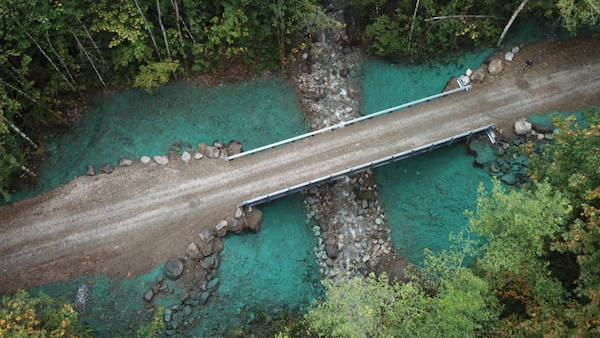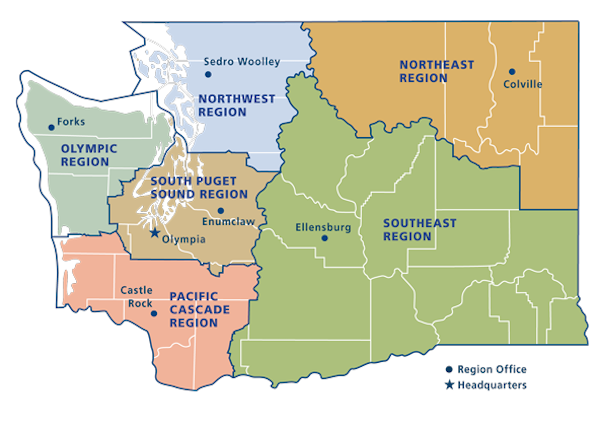
WA Timberland Owners Recognized For Fish Passage Work
THE FOLLOWING IS A PRESS RELEASE FROM THE WASHINGTON DEPARTMENT OF NATURAL RESOURCES
Washington state’s large landowners have corrected nearly 8,500 fish passage barriers and reopened 5,200 miles of fish habitat since 2001 under the Washington Road Maintenance and Abandonment Plan (RMAP) process. Today, those landowners were recognized by the state Forest Practices Board for their investments in protecting clean water for humans and fish alike.

RMAP, established in 2001 to minimize or eliminate sediment delivery to streams and rivers, correct fish barriers, and keep ditch water out of streams, has also resulted in about 31,000 miles of forest roads being brought up to current forest practices standards and another 4,000 miles roads being abandoned.
Today, the state Forest Practices Board, the Washington State Department of Natural Resources and the state departments of Ecology and Fish and Wildlife recognized more than a dozen large landowners that completed their obligations under the RMAP program before the October 2021 deadline. DNR works with WDFW and Ecology to administer the program.
“The improvements made through RMAP represent one of the greatest successes of Washington’s Forest Practices Rules. Thanks to the collective work of the state, tribes, and landowners over a span of twenty years, we have made massive strides to protect clean water and crucial fish habitats for future generations,” said Commissioner of Public Lands Hilary Franz. “I’m honored to recognize these landowners today, and the years of work they’ve completed to benefit our Evergreen State.”
Franz also acknowledged the role of DNR’s Forest Practices staff, Ecology and WDFW staff, and tribal biologists who made the RMAP program’s historic successes possible.
“Runoff from roads is one of the greatest concerns we have when it comes to sediment pollution in our rivers,” said Heather Bartlett, deputy director of the Washington Department of Ecology. “It’s heartening to see so many large forest landowners finding solutions to protect water quality, and giving salmon and other wildlife the clean, clear water they need to thrive.”
“Preserving, protecting and perpetuating fish and wildlife relies on efforts across public and private lands,” WDFW Director Kelly Susewind said. “These private landowners completing their RMAPs, especially during an economic downturn, gives me tremendous hope for our collective ability to protect and recover Washington’s biodiversity and is a strong demonstration of private landowners’ commitment to contribute to the health and wellbeing of Washington’s fish, wildlife, people, and our economy.”
“I am incredibly proud of the work that DNR’s state lands staff has put in to protect the roads and waters across the millions of acres of state trust lands we manage in Washington state,” said Duane Emmons, DNR’s acting deputy supervisor for state uplands. “The legacy of these road improvements and closures will deliver environmental benefits for generations to come.”
“Removing nearly 8,500 fish passage barriers before the October 2021 deadline is an outstanding achievement for the state and private forest landowners. Washington’s working forests are proud partners with state, tribal and federal agencies to support salmon recovery efforts while advancing forest health, economic opportunity, wildlife habitat, outdoor recreation, improved air and water quality, and a sustainable supply of renewable wood products,” said Jason Spadaro, executive director of the Washington Forest Protection Association.
The Forest Practices Board established RMAP in 2001, requiring large landowners to bring all roads constructed between 1976 and 2001 up to current forest practices standards. The program has been carried out since then in collaboration with DNR, tribes, Ecology and WDFW. Originally, the program had a deadline for completion by large landowners in 2016. However, in 2011, the Board allowed for a five-year extension due to the economic impacts of the Great Recession.
Today, the Board recognized the landowners that were granted extensions, and completed their work under RMAP by the new Oct. 31, 2021, deadline.
The Forest Practices Board is an independent state agency chaired by the Commissioner of Public Lands or her designee. It was established by the 1974 Forest Practices Act. The board adopts Forest Practices Rules that are implemented by DNR’s Forest Regulation program, protecting water quality and wildlife habitat while maintaining a viable wood products industry in Washington state.

Large landowners recognized at Wednesday’s meeting, grouped geographically by DNR Region, include:
Northeast Region
- Manulife Investment Management
Northwest Region
- Mid-Valley Resources
- Sierra Pacific Industries
Olympic Region
- Anderson and Middleton
- Bavarian Timber
- City of Hoquiam
- DNR State Lands – Olympic Region
- Fruit Growers Supply Company
- Olympic Timber LLC c/o Campbell Global
- Rayonier Forest Resources, LP
- Weyerhaeuser Company
Pacific Cascade Region
- BTG Pactual OEF
- BTG Pactual PNW Fund III REIT, Inc.
- DNR State Lands – Pacific Cascade Region
- Fruit Growers Supply Company
- Mid-Valley Resources
- PacifiCorp
- Rayonier Timberlands Holding Company, Washington, Inc.
- SDS Company, LLC
- Sierra Pacific Ryderwood
- Weyerhaeuser Company – Aberdeen
- Weyerhaeuser Company – Longview/St. Helens
- Weyerhaeuser Company – Lower Columbia Region
- Weyerhaeuser Company – Pe Ell
- Weyerhaeuser Company – Vail
South Puget Sound Region
- DNR State Lands – South Puget Sound Region
- Fruit Growers Supply Company
- BTG Pactual
